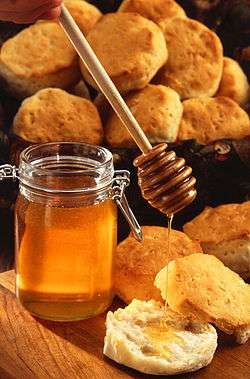honey
See also: Honey
English

A jar of honey, with a honey dipper and scones
Etymology
From Middle English hony, honi, from Old English huniġ, from Proto-Germanic *hunagą (compare West Frisian hunich, German Honig), from earlier *hunangą (compare Swedish honung), from Proto-Indo-European *kn̥h₂onk-o-s, from *kn̥h₂ónks. Cognate with Middle Welsh canecon (“gold”), Latin canicae pl (“bran”), Tocharian B kronkśe (“bee”), Albanian qengjë (“beehive”), Ancient Greek κνῆκος (knêkos, “safflower”), Kurdish şan (“beehive”).
Pronunciation
- IPA(key): /ˈhʌni/
Audio (US) (file) - Rhymes: -ʌni
- Hyphenation: hon‧ey
Noun
honey (usually uncountable, plural honeys)
- (uncountable) A viscous, sweet fluid produced from plant nectar by bees. Often used to sweeten tea or to spread on baked goods.
- (countable) A variety of this substance.
- (figuratively) Something sweet or desirable.
- 1595, William Shakespeare, Romeo and Juliet, Act 5, Scene 3, lines 91–93:
- O my love, my wife! / Death, that hath suck'd the honey of thy breath / Hath had no power yet upon thy beauty.
- (Can we date this quote?) Shakespeare
- the honey of his language
- 1595, William Shakespeare, Romeo and Juliet, Act 5, Scene 3, lines 91–93:
- A term of affection.
- Honey, would you take out the trash?
- Honey, I'm home.
- (countable, informal) A woman, especially an attractive one.
- Man, there are some fine honeys here tonight!
- A spectrum of pale yellow to brownish-yellow colour, like that of most types of (the sweet substance) honey.
- honey colour:
Synonyms
- (sweet fluid from bees): mel
- (term of affection): darling, sweetie, see also Thesaurus:sweetheart
Hypernyms
Hyponyms
Hyponyms of honey (noun)
- blended honey
- comb honey
- creamed honey
- crystallised/crystallized honey
- dried honey
- filtered honey
- honeycomb
- honeydew
- honeydew honey
- honey extractor
- monofloral honey
- pasteurised honey
- polyfloral honey
- raw honey
- strained honey
- ultrasonicated honey
Descendants
- Sranan Tongo: oni
Translations
sweet substance produced by bees
|
|
variety of honey
|
term of affection
|
|
informal: attractive woman
colour
Adjective
honey (not comparable)
- Involving or resembling honey.
- 1599 William Shakespeare, Henry V, act 1, scene 2:
- So work the honey-bees, / Creatures that by a rule in nature teach / The act of order to a peopled kingdom.
- 1599 William Shakespeare, Henry V, act 1, scene 2:
- Of a pale yellow to brownish-yellow colour, like most types of honey.
Translations
involving or resembling honey
|
honey-colored
|
|
- The translations below need to be checked and inserted above into the appropriate translation tables, removing any numbers. Numbers do not necessarily match those in definitions. See instructions at Wiktionary:Entry layout#Translations.
Translations to be checked
|
Verb
honey (third-person singular simple present honeys, present participle honeying, simple past and past participle honeyed)
- (transitive) To sweeten; to make agreeable.
- (intransitive) To be gentle, agreeable, or coaxing; to talk fondly; to use endearments.
- Shakespeare
- Honeying and making love.
- Shakespeare
- (intransitive) To be or become obsequiously courteous or complimentary; to fawn.
- 1847, Alfred Tennyson, The Princess: A Medley, London: Edward Moxon, […], OCLC 2024748, prologue, page 6:
- [O]ne / Discuss'd his tutor, rough to common men / But honeying at the whisper of a lord; / And one the Master, as a rogue in grain / Veneer'd with sanctimonious theory.
-
Derived terms
Related terms
Related terms
- honey badger
- honey bear
- honey bucket
- honey bun
- honey bunch
- honey decoction
- honey dipper
- honey drizzler
- honey fungus
- honey guide
- honey locust
- honey mesquite
- honey mouse
- honey myrtle
- honey parrot
- honey plant
- honey-buzzard
- honeycomb moth
- honeydew melon
- land of milk and honey
- western honey mesquite
See also
- Appendix:Colors
other entries of interest
This article is issued from
Wiktionary.
The text is licensed under Creative
Commons - Attribution - Sharealike.
Additional terms may apply for the media files.